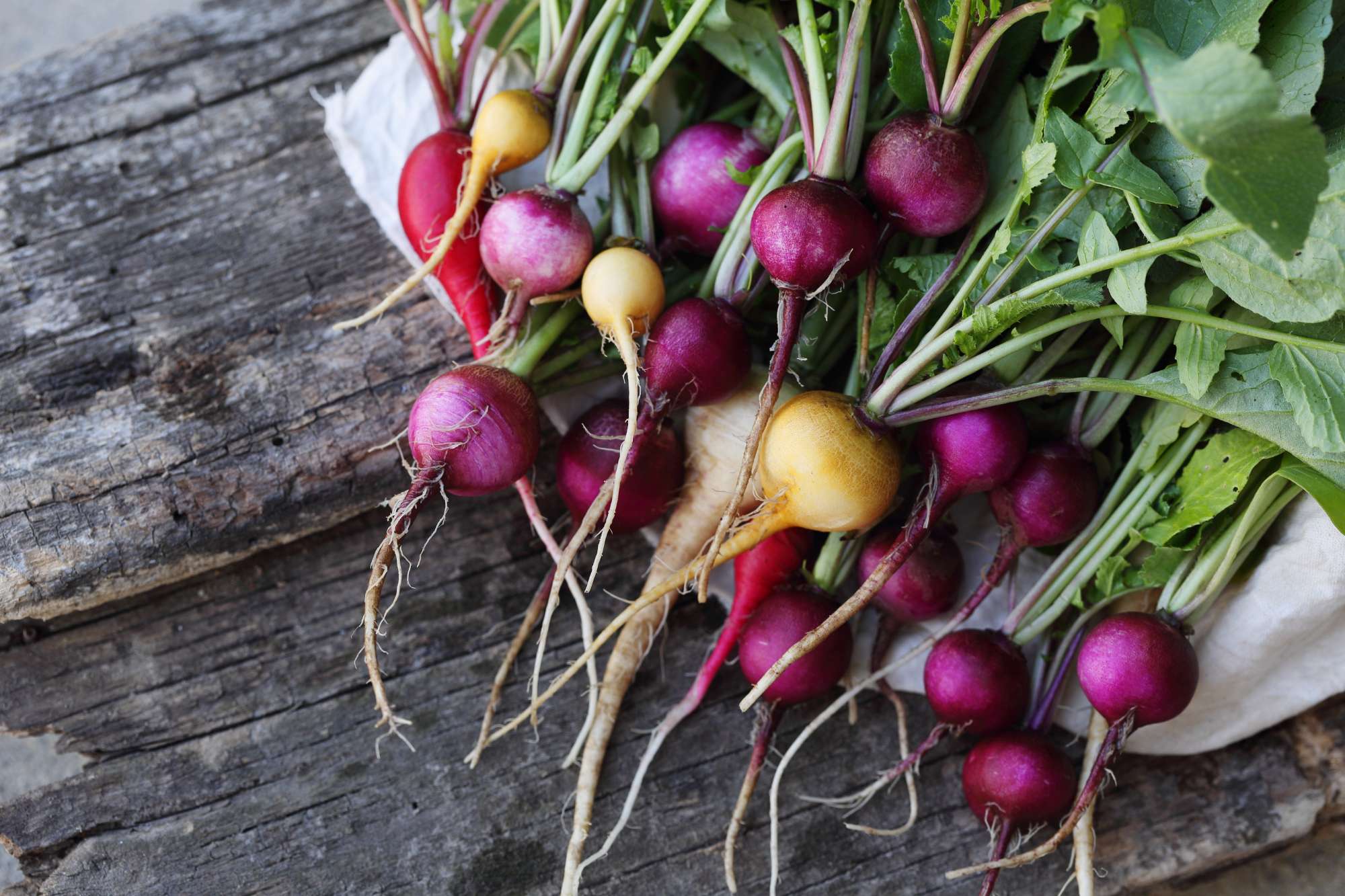Daikon is low in calories, rich in vitamin C and antioxidants.
Daikon is low in calories, rich in vitamin C and antioxidants.
Daikon nutrient-packed vegetable offers a range of health benefits, including improved digestion, enhanced immunity, and potential cancer-fighting properties.
Loaded with nutrients and low in calories, Daikon is rich in C and B9, contains plant compounds such as polyphenol antioxidants ferulic acid and quercetin, and more. This suggests that eating daikon can help boost your health in a variety of ways, including boosting your immune system, fighting inflammation, promoting good bone and skin health, and ultimately helping you lose weight.
There are many different varieties of daikon. They vary in shape, color, and flavor. Daikon (Raphanus sativus, variety Longipinnatus, family Brassicaceae) is native to China and Japan.It’s cultivated worldwide as a food for people and livestock and for its seed oil, which is used in the cosmetic industry. Farmers also plant it as a cover crop to improve soil health and increase crop yield.
Daikon also known as luóbo, winter, white, oilseed, and icicle radish
Daikon is known for its potent medicinal properties, is low in calories and high in vitamin C, and has a crunchy texture, similar to other radishes. Like other radishes, Daikon can be served raw, it has a cool, sweet and slightly spicy taste. This root vegetable is an important ingredient in Korean, Chinese, Japanese, Vietnamese, and Indian cuisine.
Daikon is considered a winter radish, which grows slower and is larger than spring radishes. Winter radishes are sown in mid to late summer and harvested during cooler weather. While spring radishes are sown in early spring, and they are usually harvested 3 - 4 weeks after sowing, once they reach the desired size and firmness.
TYPES OF DAIKON
Daikon radishes have a crispy texture and resemble large carrots. Their flavor is milder than that of other radish varieties and is described as slightly sweet yet slightly spicy. Though most commonly white with leafy green tops, daikon radishes come in a variety of hues, including red, green, and purple. They grow in three shapes — cylindrical, oblong, and spherical.
1. Miyashige White. This daikon is white and has a cylindrical root that grows 41–46 cm long. It has a crisp texture and mild flavor.
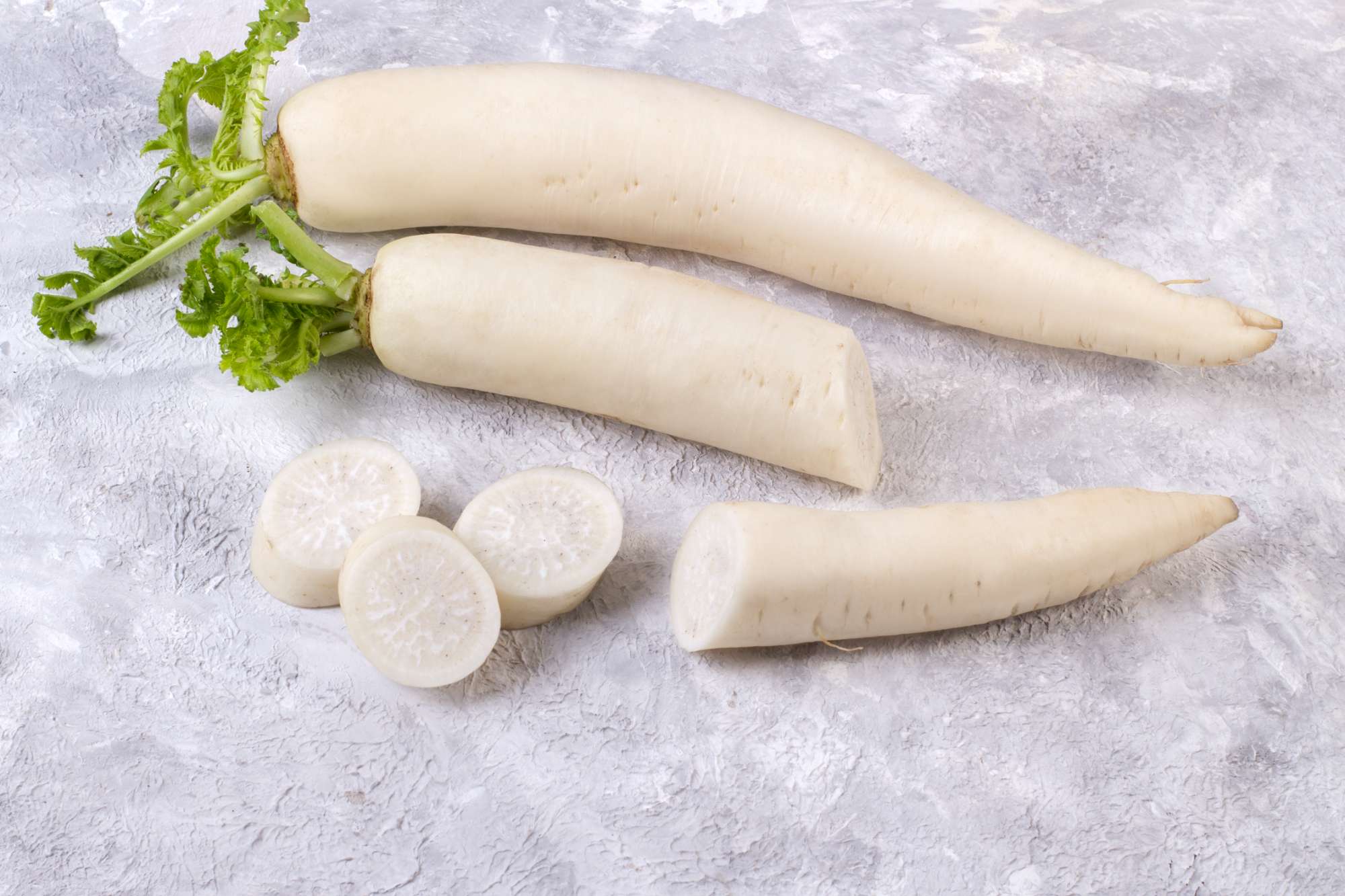
2. KN-Bravo. KN-Bravo is a beautiful daikon variety that has purple skin and light purple to white flesh. The roots can grow up to 15 cm long and have a slightly sweet flavor.
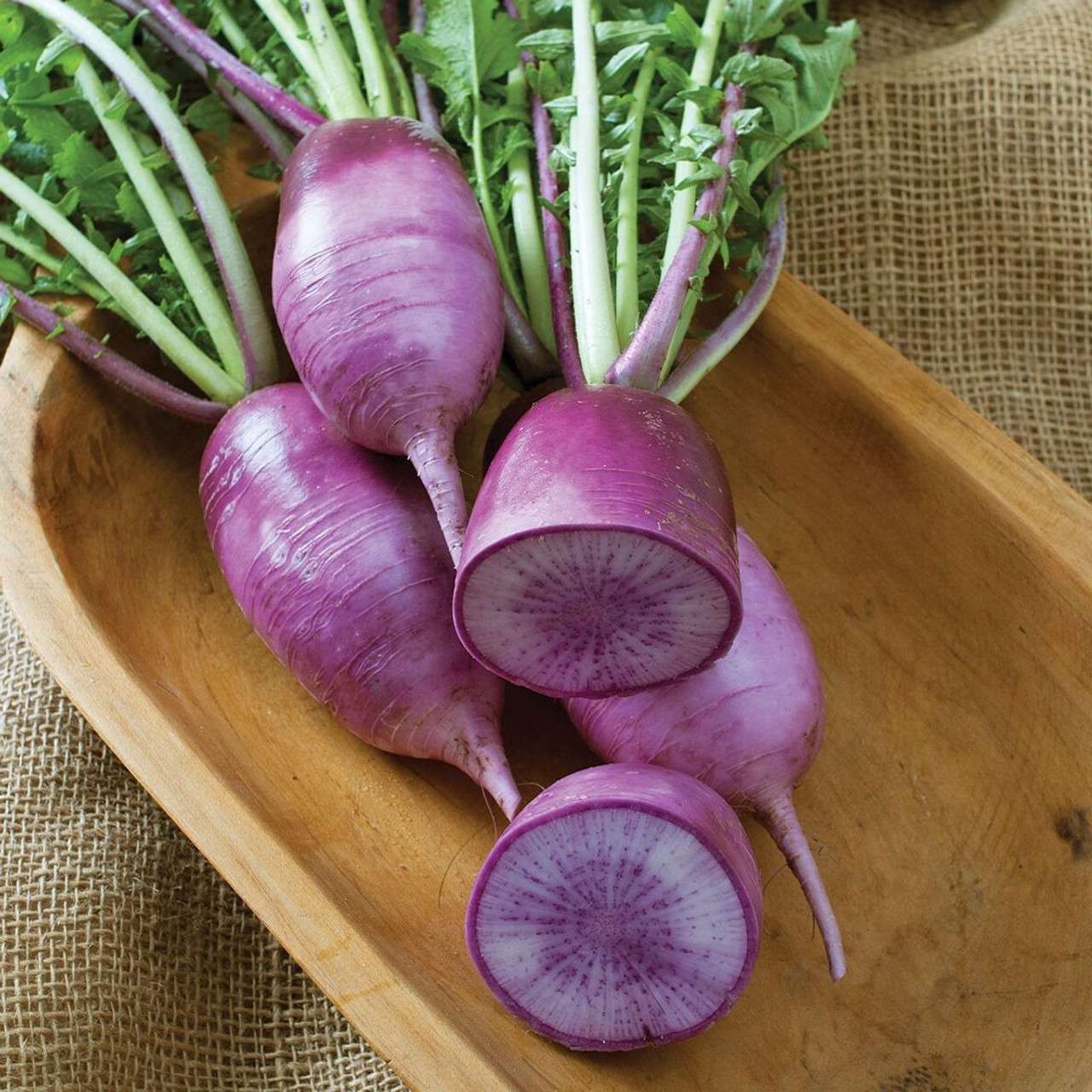
3. Alpine. The Alpine daikon has short roots that grow 13–15cm long. This variety is a popular choice to make kimchi — a fermented vegetable dish — and has a sweeter taste than longer daikon varieties.
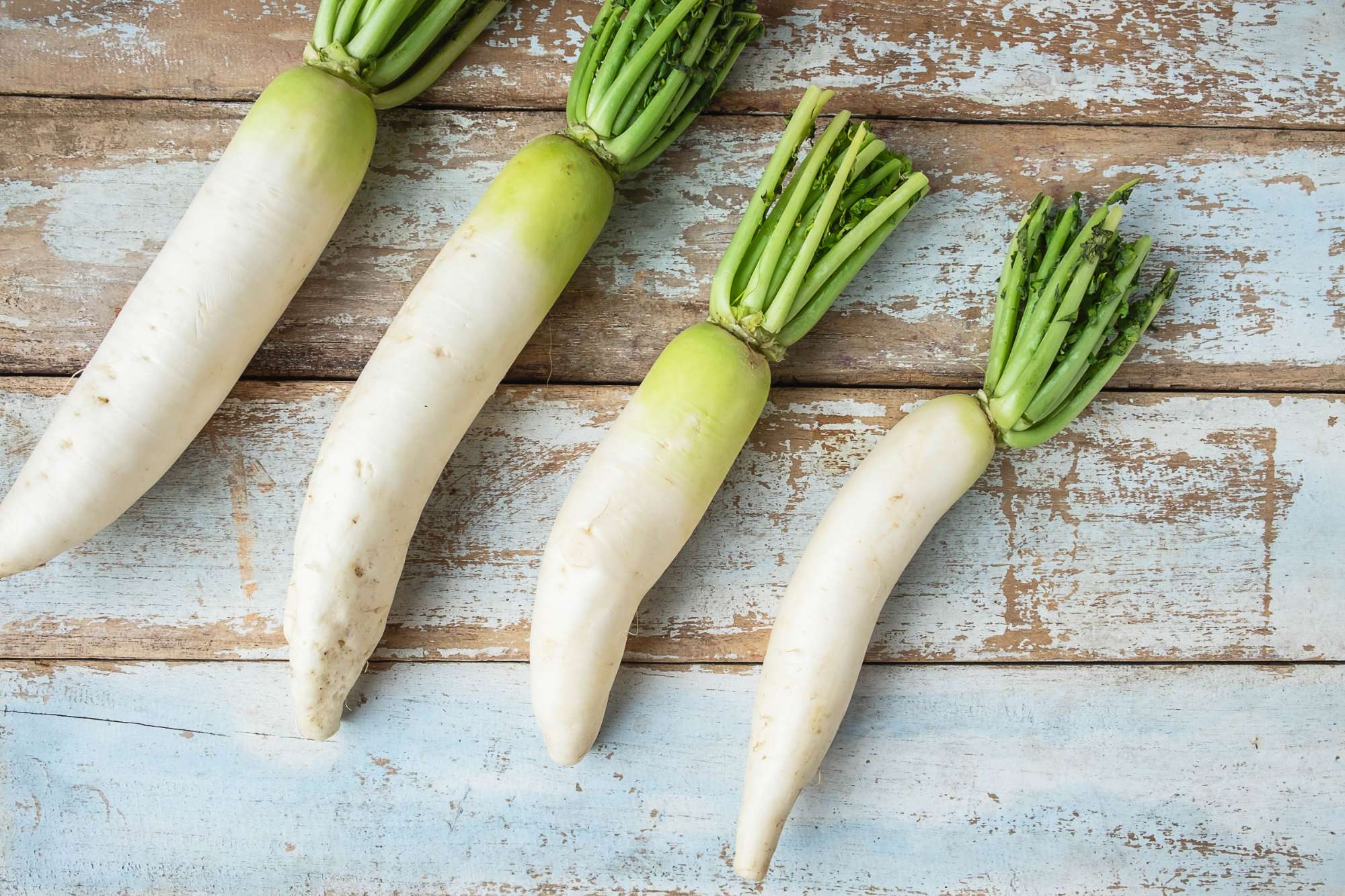
4. Watermelon radish. This daikon variety has pale, greenish skin, yet reveals a bright pink flesh when cut open. It’s spherical and slightly sweet and peppery.
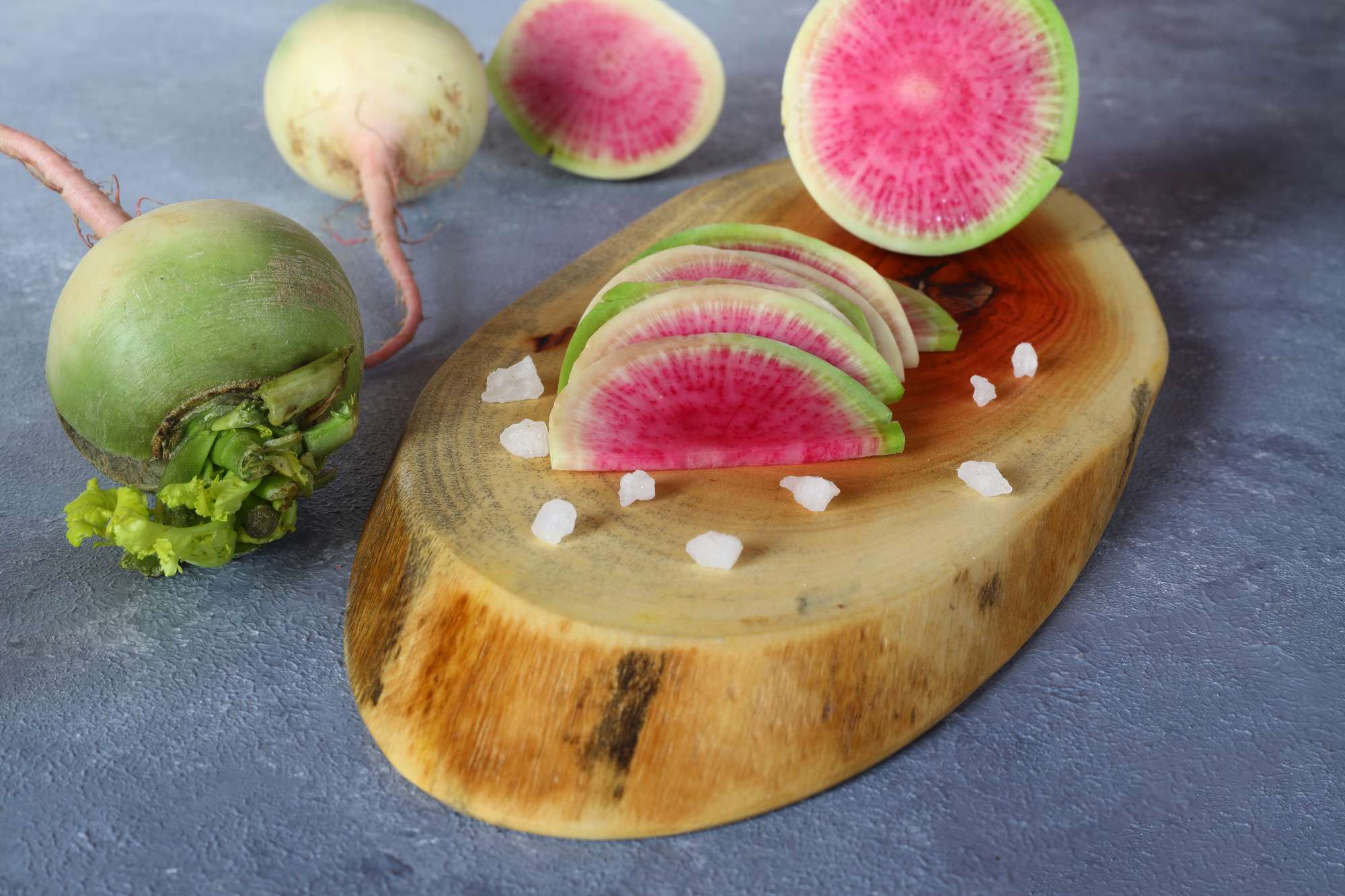
5. Japanese Minowase. Minowase daikon is amongst the largest varieties, with roots growing up to 61 cm long. They’re white and have a sweet flavor and crunchy texture.
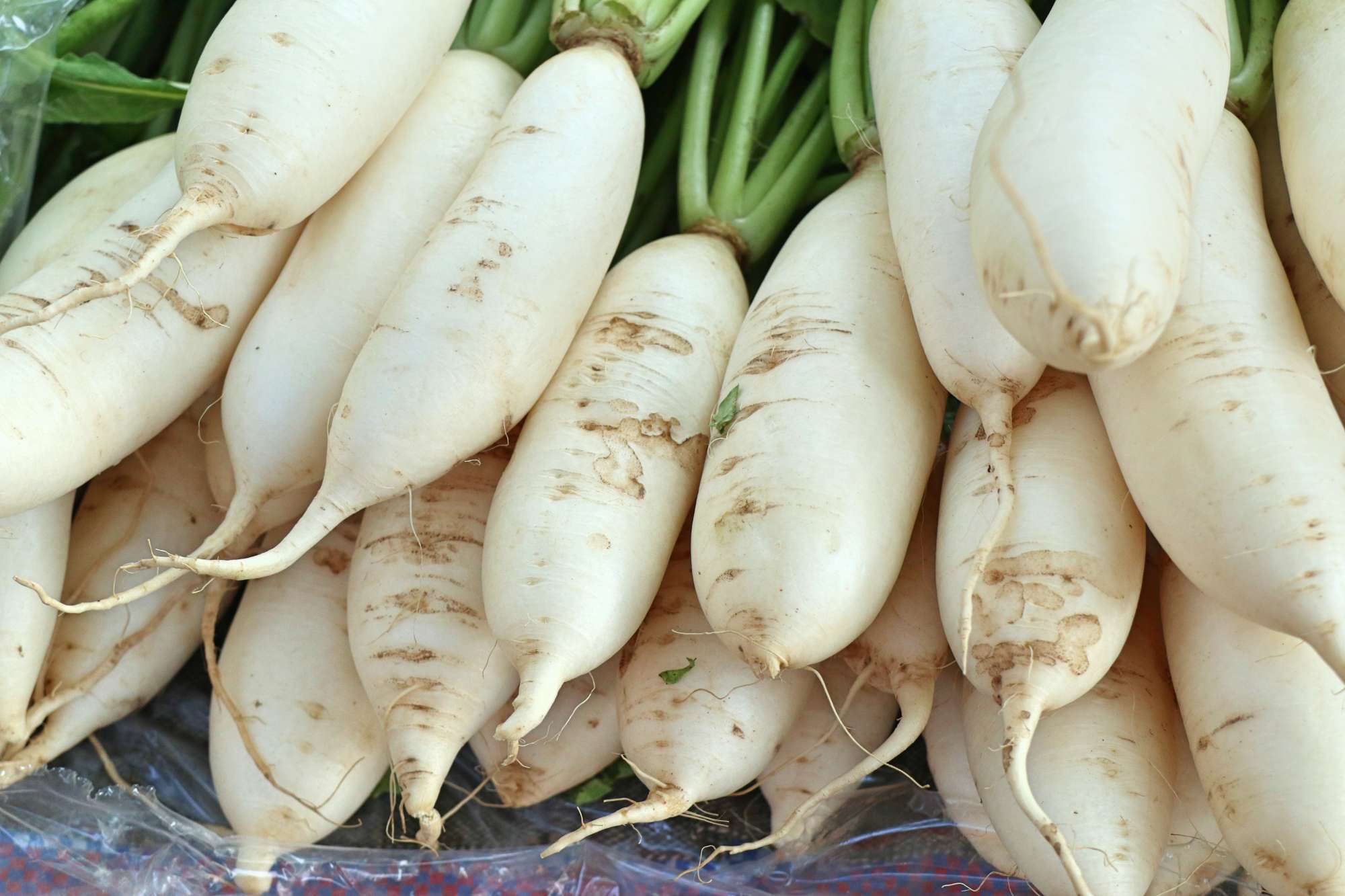
6. Shunkyo, this cylindrical variety has red skin and white flesh. It grows 10–12 cm long and is known for its fiery yet sweet flavor and pink-stemmed leaves.
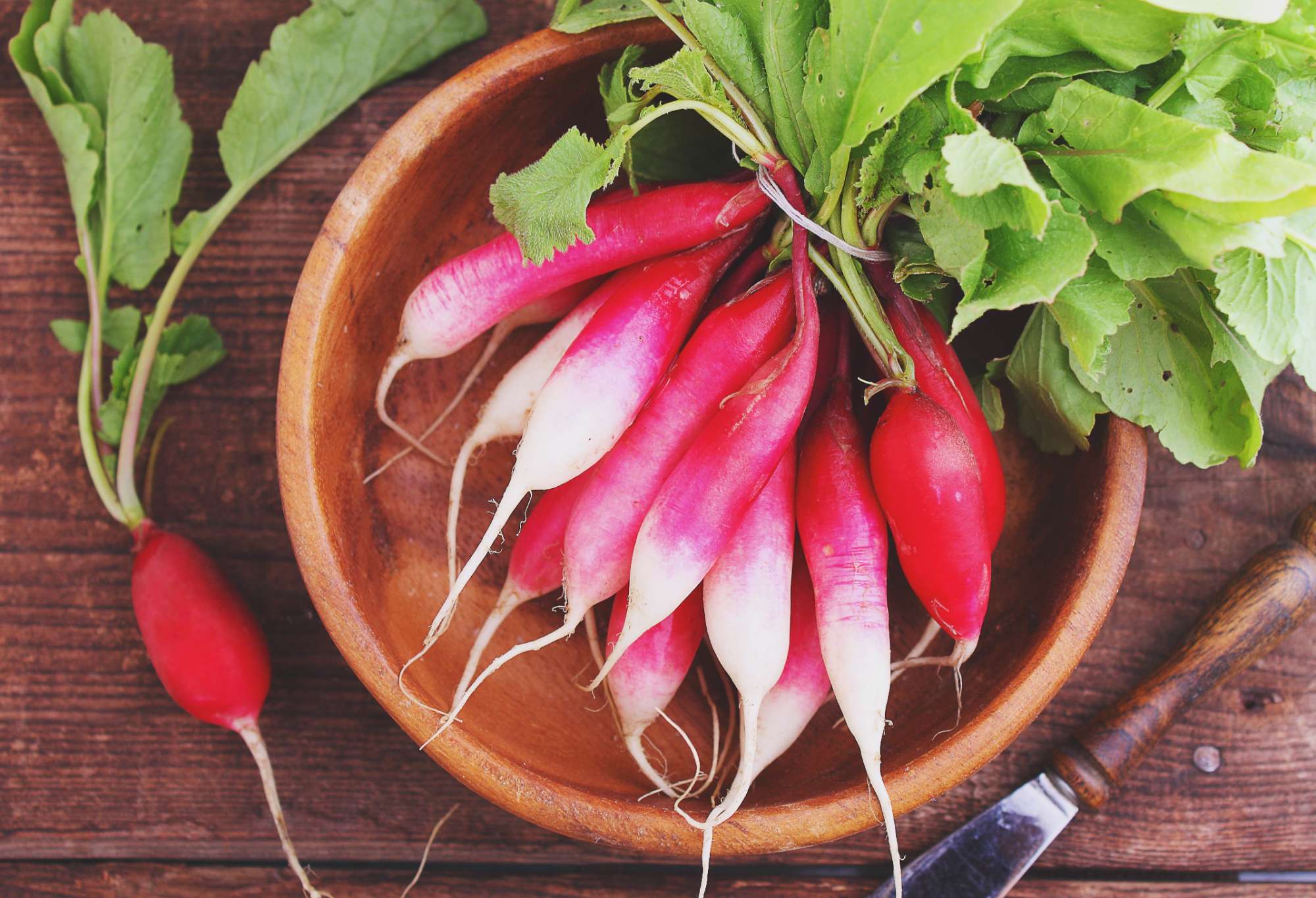
DAIKON NUTRITION
Daikon is low in calories yet high in many nutrients, particularly vitamin C and folate. One 18-cm daikon weighing 338 grams packs the following nutrients:
- Calories: 61
- Carbs: 14 grams
- Protein: 2 grams
- Fiber: 5 grams
- Vitamin C: 124% of the Daily Value (DV)
- Folate (B9): 24% of the DV
- Calcium: 9% of the DV
- Magnesium: 14% of the DV
- Potassium: 22% of the DV
- Copper: 19% of the DV.
Rich in protective plant compounds
Daikon contains many plant compounds like the polyphenol antioxidants ferulic acid and quercetin which have anti-inflammatory, anticancer, and immune-boosting properties. Daikon also offers biologically active compounds called glucosinolates, which break down to form isothiocyanates. Test-tube and animal research shows that these compounds may provide powerful cancer-fighting properties, including of the colon and lungs.
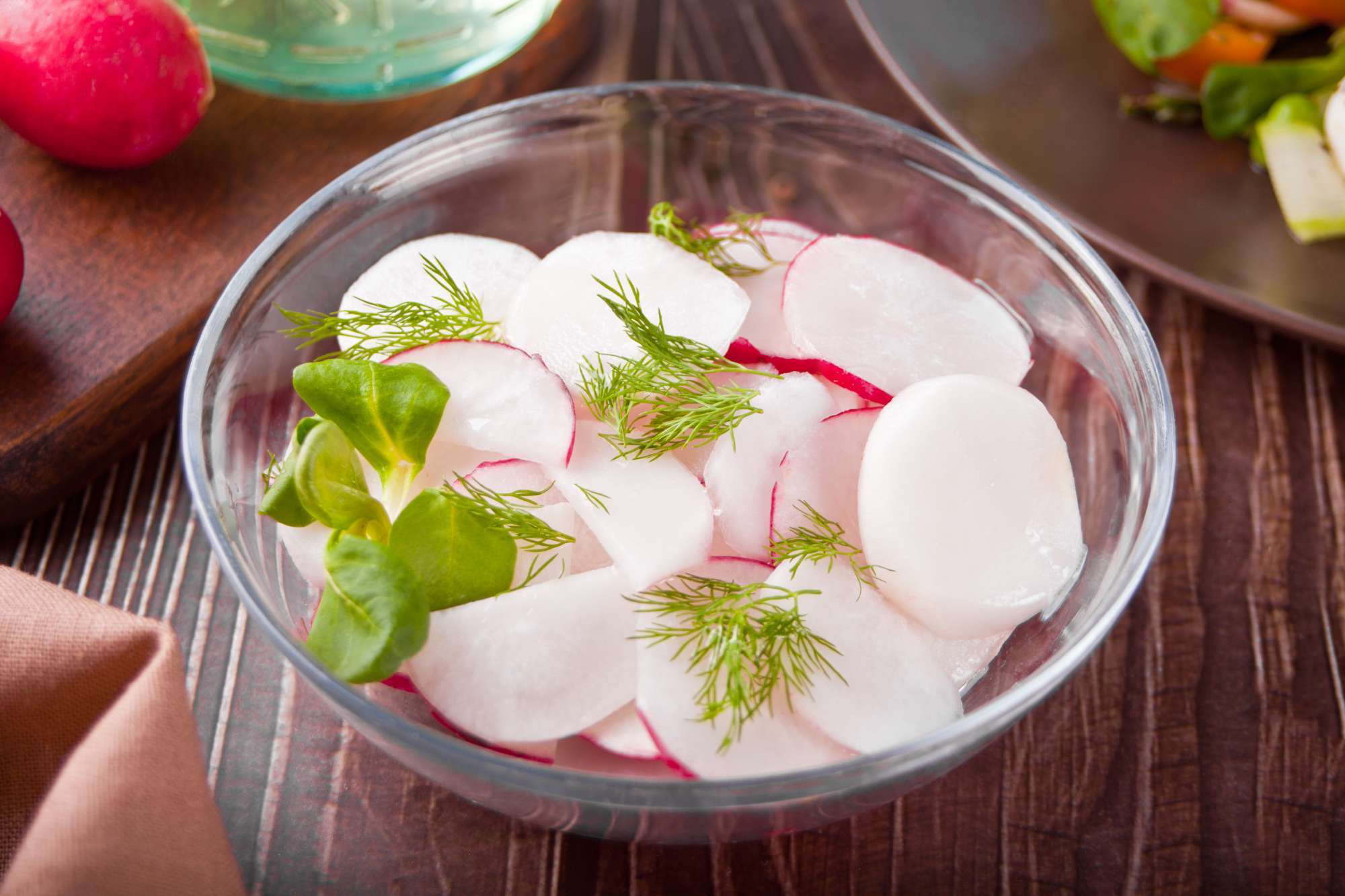
POTENTIAL HEALTH BENEFITS
1. Anti-inflammatory properties
Anti-inflammatory compounds which are found in abundance in daikon juice and also in the roots and leaves of the daikon plant help to curtail inflammation throughout the body. This has a number of good effects for your body which include keeping your heart in good health, reducing the risk of developing arthritis, treating gout and also daikin helps to reduce discomfort and pain from injuries and muscle strains.
2. Promotes wound healing
Daikon is an excellent source of vitamin C (124% Daily Value), which helps the body produce white blood cells that are essential for healing and repairing cells and tissues in the body.
3. Protects against cell damage
Vitamin C is also an antioxidant that may protect cells from damage by free radicals. These molecules may harm the body when their levels reach too high. Research suggests that a diet rich in cruciferous vegetables, including daikon, may reduce cancer risk.
Additionally, daikon contains certain anti-oxidant phenolic compounds that help to prevent or fight various types of cancer, particularly those pertaining to the stomach. This is primarily due to the presence of nitrosamine which prevents the growth of various substances that may cause cancer.
4. Help stabilize blood sugar
Daikon, a non-starchy vegetable, has minimal carbohydrates, making it an ideal vegetable for people with diabetes to include in their diet. It is also considered a low glycemic food, which measures how quickly a food will raise blood sugar. It has been noted in research that eating non-starchy vegetables with a low glycemic index, such as daikon, are ideal to include in the diets of individuals with type 2 diabetes, as they can help with blood sugar control.
5. Promote weight loss
Eating low-calorie, high-fiber foods like daikon can help you maintain a healthy weight or lose weight if that’s your goal. Daikon is considered a non-starchy vegetable, meaning it’s very low in carbs. Research has demonstrated that eating non-starchy vegetables can promote a healthy body weight. For example, a study of 1,197 people found that those who ate more non-starchy vegetables had less body fat and lower levels of insulin, a hormone involved in fat storage.
What’s more, daikon is high in fiber which may decrease hunger levels by slowing digestion and increasing fullness, which may help boost weight loss.
6. Good for your bones
Daikon, like other cruciferous vegetables, is a good source of calcium. Calcium is essential for bones and helps to prevent osteoporosis and other ailments that plague our bones when we start getting old. Incorporating daikin in your diet will surely slow down the aging effect on your bones and help you to lead a normal and healthy life.
7. Benefits of digestion
Amylase and esterase are digestive enzymes that can be found in daikon juice. It helps to break up complex carbohydrates, proteins, and fats into simpler compounds that can be easily digested by our body. This helps you to retain the essential nutrients of any food that you eat and also facilitates the smooth movement of fecal matter.
8. Helps to deal with respiratory problems
Daikon juice has antibacterial and antiviral activities and helps you to deal with various respiratory problems. Excess phlegm and mucus in your respiratory tracts trap bacteria and cause various problems. Daikon juice helps to eliminate the excess phlegm and, in this process, eliminates the harmful bacteria and thereby helps to keep your respiratory system healthy.
9. Helps to detoxify your body
Daikon has diuretic properties and so it facilitates the excretion of urine. This process helps to flush out all the harmful toxins from the body and thus keeps the kidneys clean. Thus, all unhealthy substances are eliminated from your body easily.
10. Daikon good for your skin
Consumption of daikin is good for your skin. Daikin has anti-oxidant properties that help us to fight the disease-causing free radicals in our body. Consumption of daikin in moderate quantities help us to prevent wrinkles, increase the glow of our skin, reduce the appearance of blemishes and dark spots and also regulate the circulation of blood to the skin.
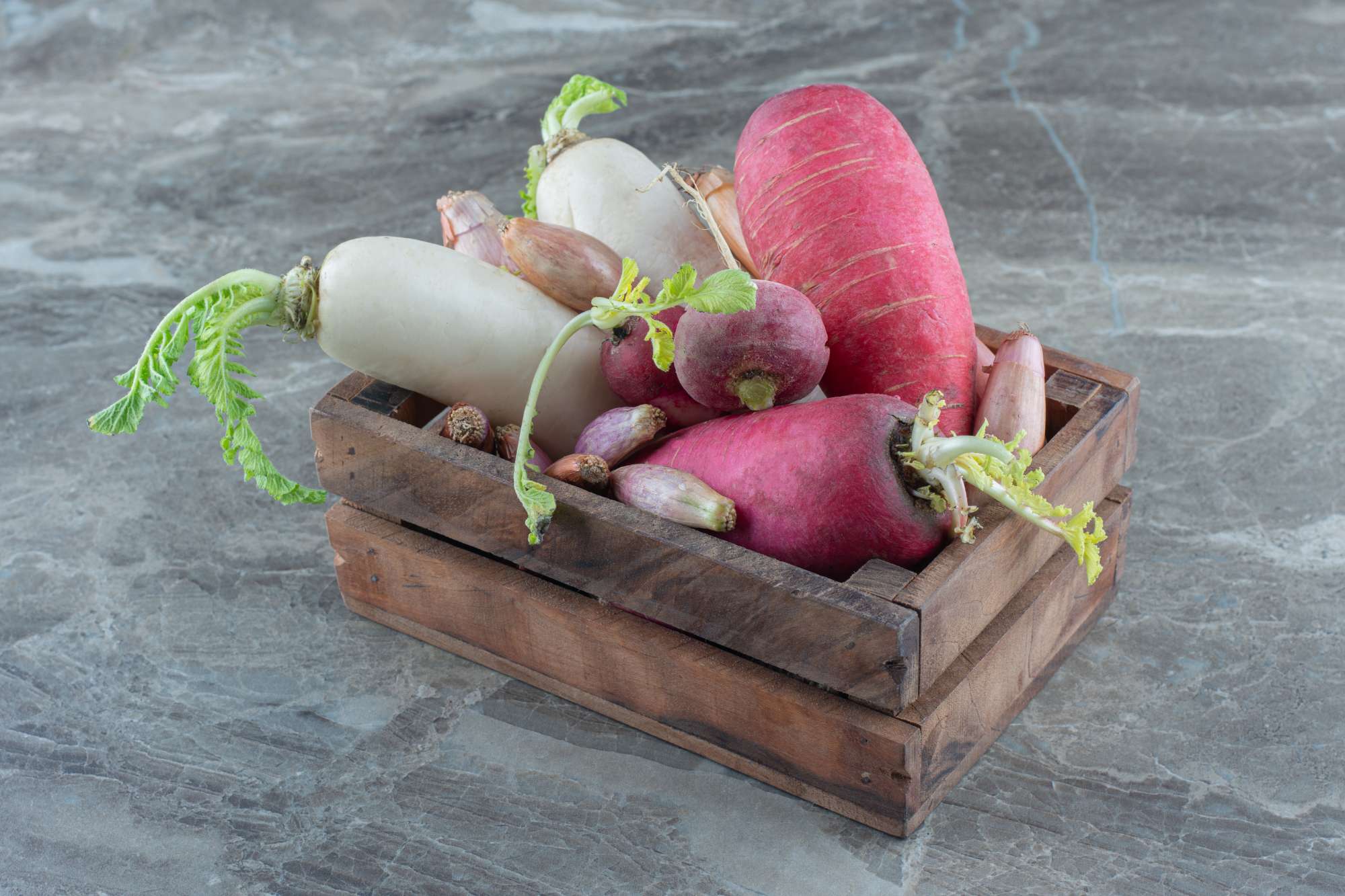
SIDE EFFECTS AND ALLERGIES
Daikon being an edible vegetable, daikon is presumed to be relatively safe but it has a few side-effects too. The side effects that one may experience after consuming daikon are mainly related to dermatitis and asthma.
Daikon is also considered harmful for those suffering from gallstones. The compound in daikin that has been found to prevent or fight cancer also has an effect on the functioning of the thyroid gland. Pregnant and breast-feeding women are also advised to refrain from consuming this vegetable.
Moreover, people on vasodilators, including people who consume anti-migraine medication and blood pressure drugs should be careful in consuming this vegetable as it itself has the same property.
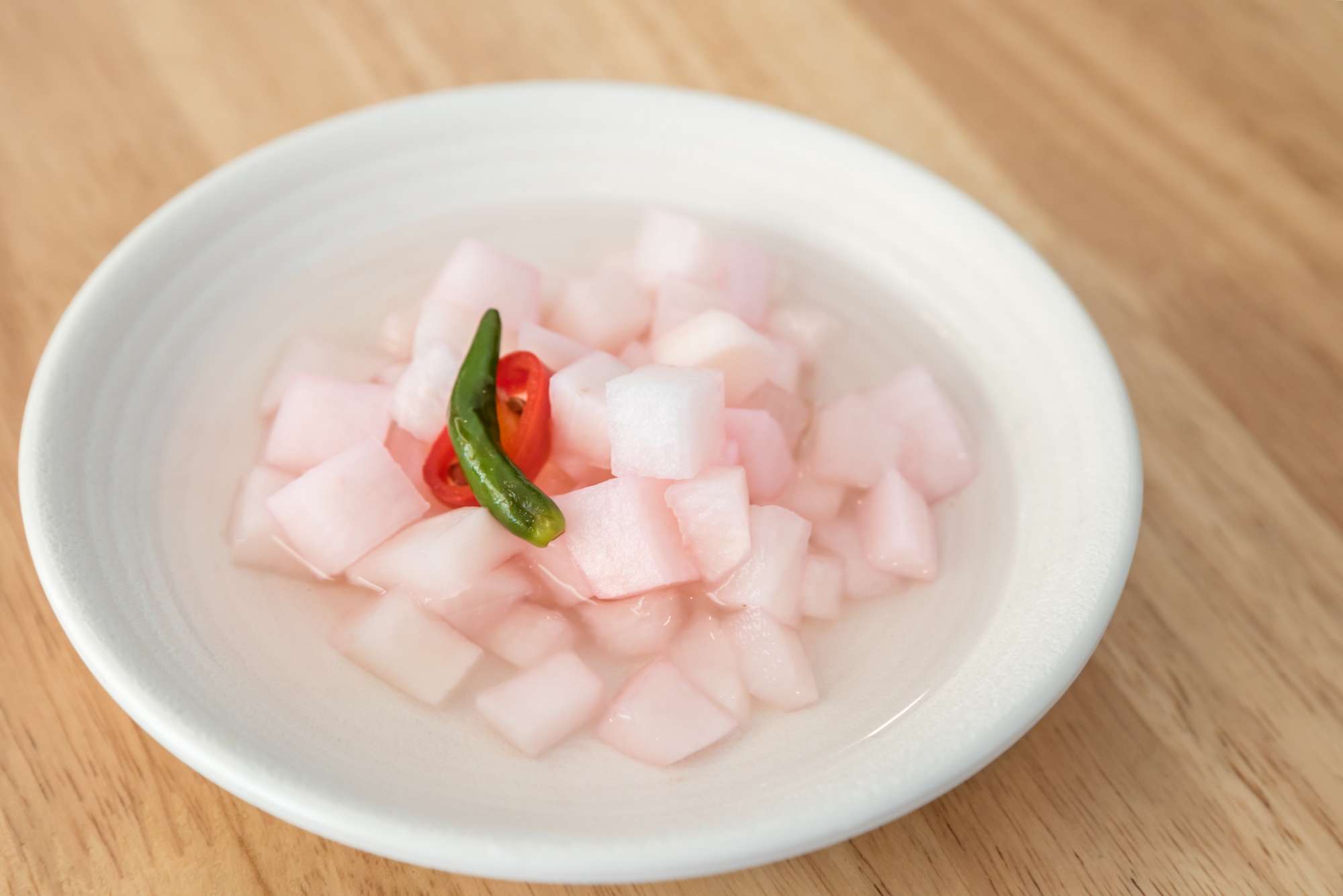
FOODS SHOULD NOT BE COMBINED
Daikon can be processed in various ways such as boiled beets, cooked bone broth, stir-fried, even raw. However, when processing beets are not combined with the following foods, otherwise it will have a great impact on health.
1. Don't eat daikon with wood ear
You should not turn daikon with wood ear, as you will probably face dermatitis. Accordingly, the enzymes in daikon will react chemically with the biological substances in the ear fungus, leaving your skin in trouble.
2. Don't eat daikon with apples, pears, and grapes
According to traditional medicine, you should not eat white radish with grapes, pears, and apples because it can cause goiter symptoms. Specifically, the copper cetan in these fruits can react with daikon acid cianogen. This reaction can potentially lead to the formation of substances that may cause goiter and severe hypothyroidism if consumed regularly.
3. Don't eat daikon with carrots
Daikon is rich in vitamin C, but carrots contain many enzymes that break down this vitamin. So, using these two foods is like you accidentally destroying the amount of vitamin C taken into the body.
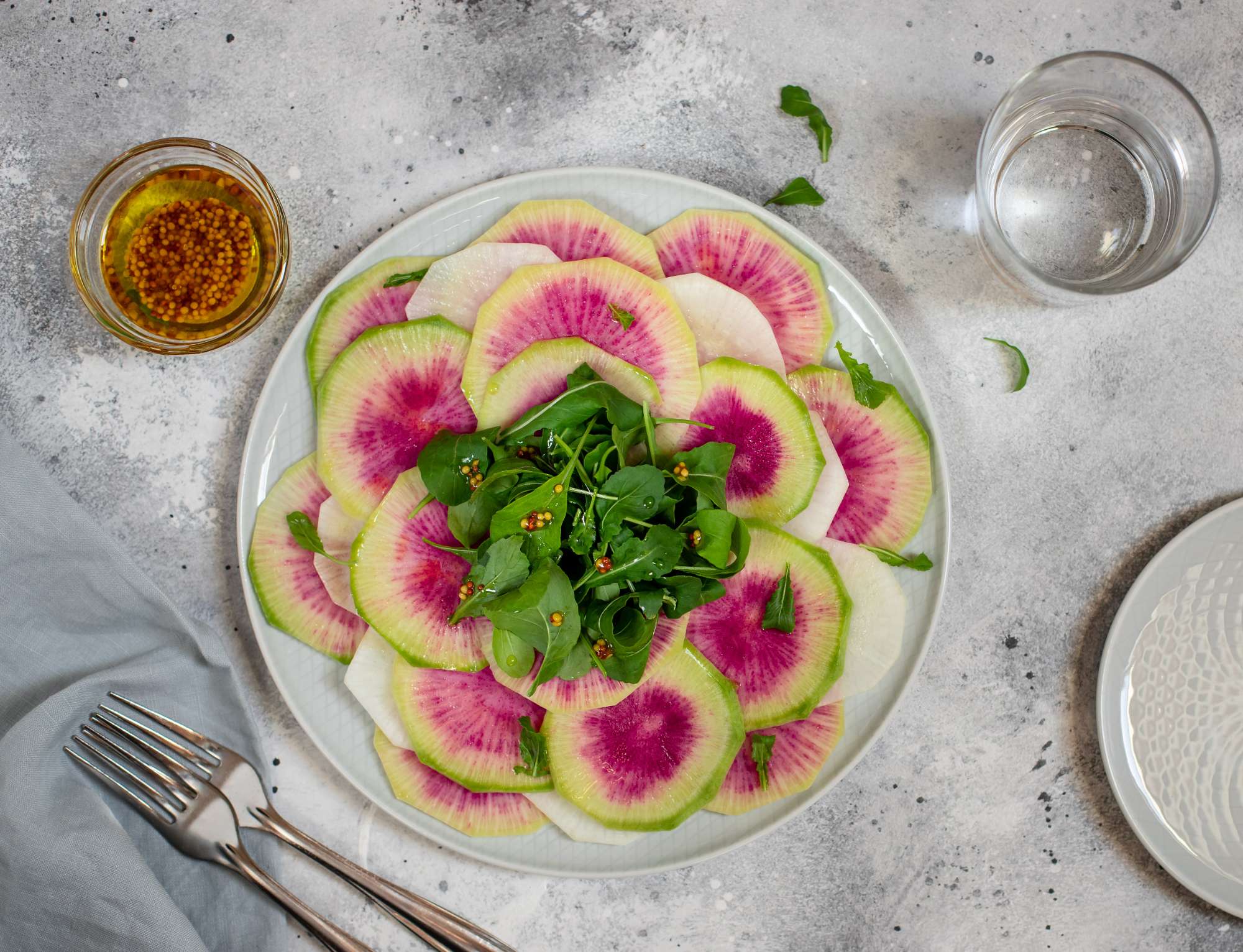
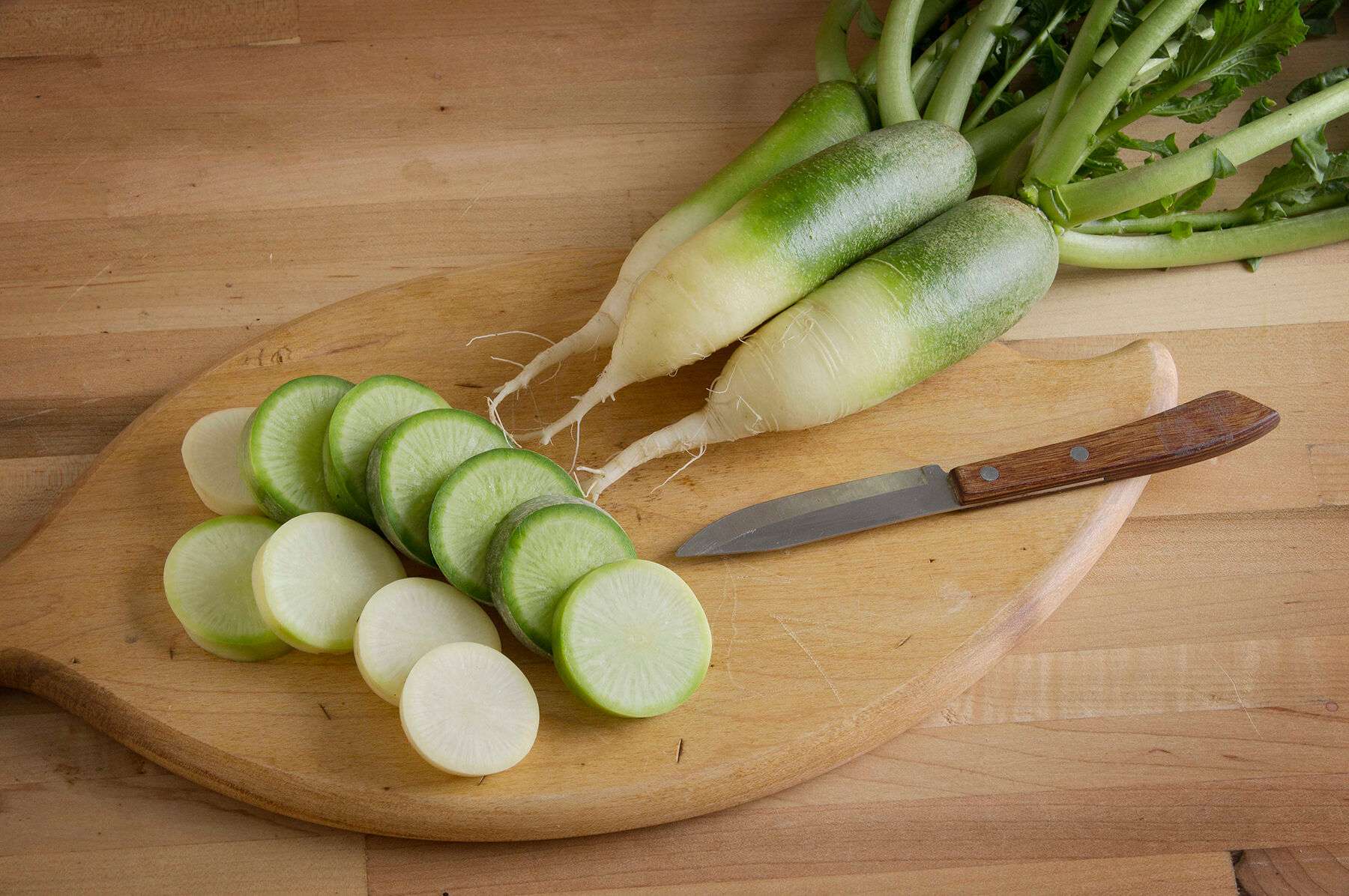
CULINARY USES
Daikon can be enjoyed raw, pickled, or cooked. It’s an integral ingredient in Asian cooking, though it lends itself to many cuisines.
Here are some interesting ways to add daikon to your diet:
Though tiny, they have powerful medicinal properties and have exhibited antioxidant and anticancer effects
- Grate raw daikon over a salad for a nutritious, crunchy topping.
- Add daikon to stir-fries to kick up the flavor.
- Use daikon in soups and stews in place of carrots.
- Add daikon to veggie spring rolls for a crispy texture.
- Steam daikon and top it with a drizzle of olive oil, salt, and pepper for a low-calorie side dish.
- Serve raw, sliced daikon alongside other veggies with a tasty dip for a healthy appetizer.
- Incorporate daikon into Asian dishes, such as curries and soups.
Note that all parts of the daikon plant can be eaten, including the leafy green tops, which can be added to sautés and soups.
Compiled and written by Crocus Media


